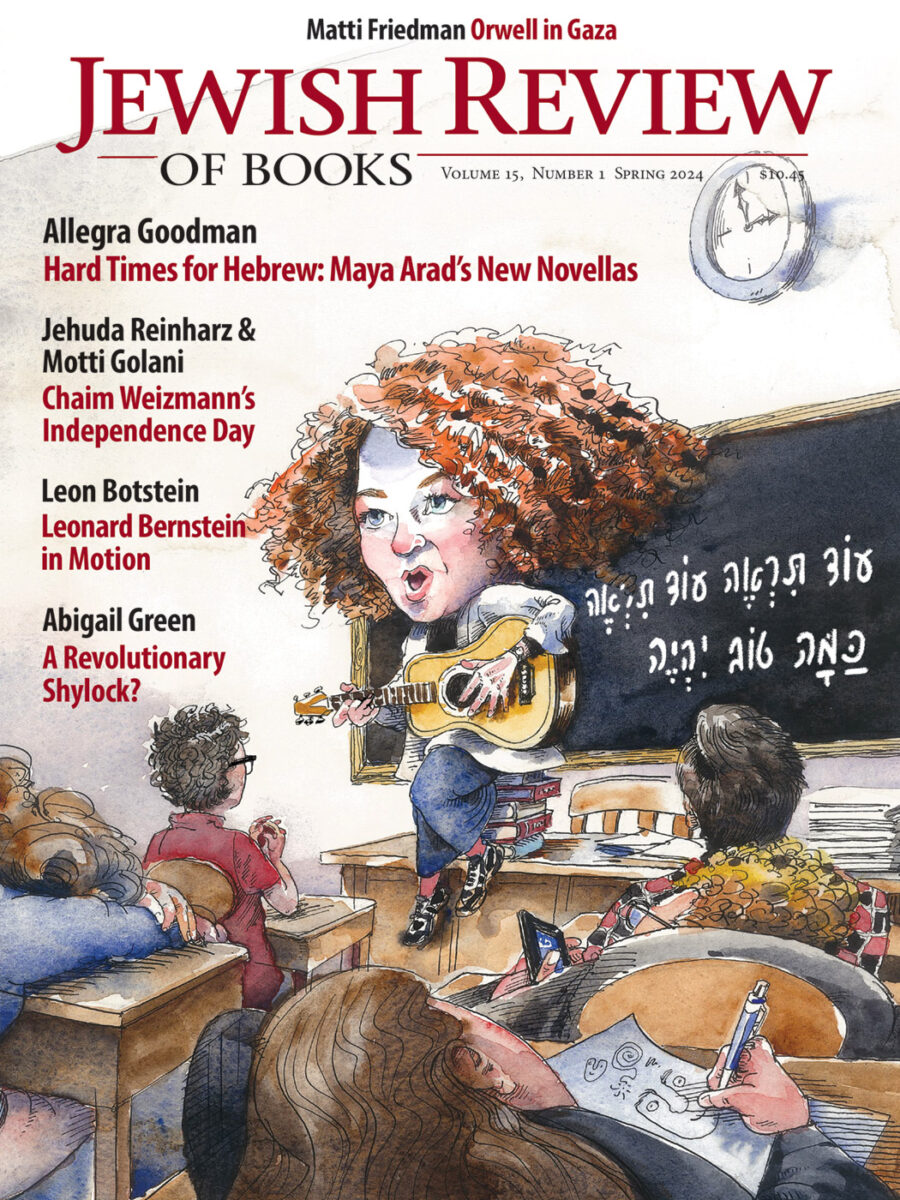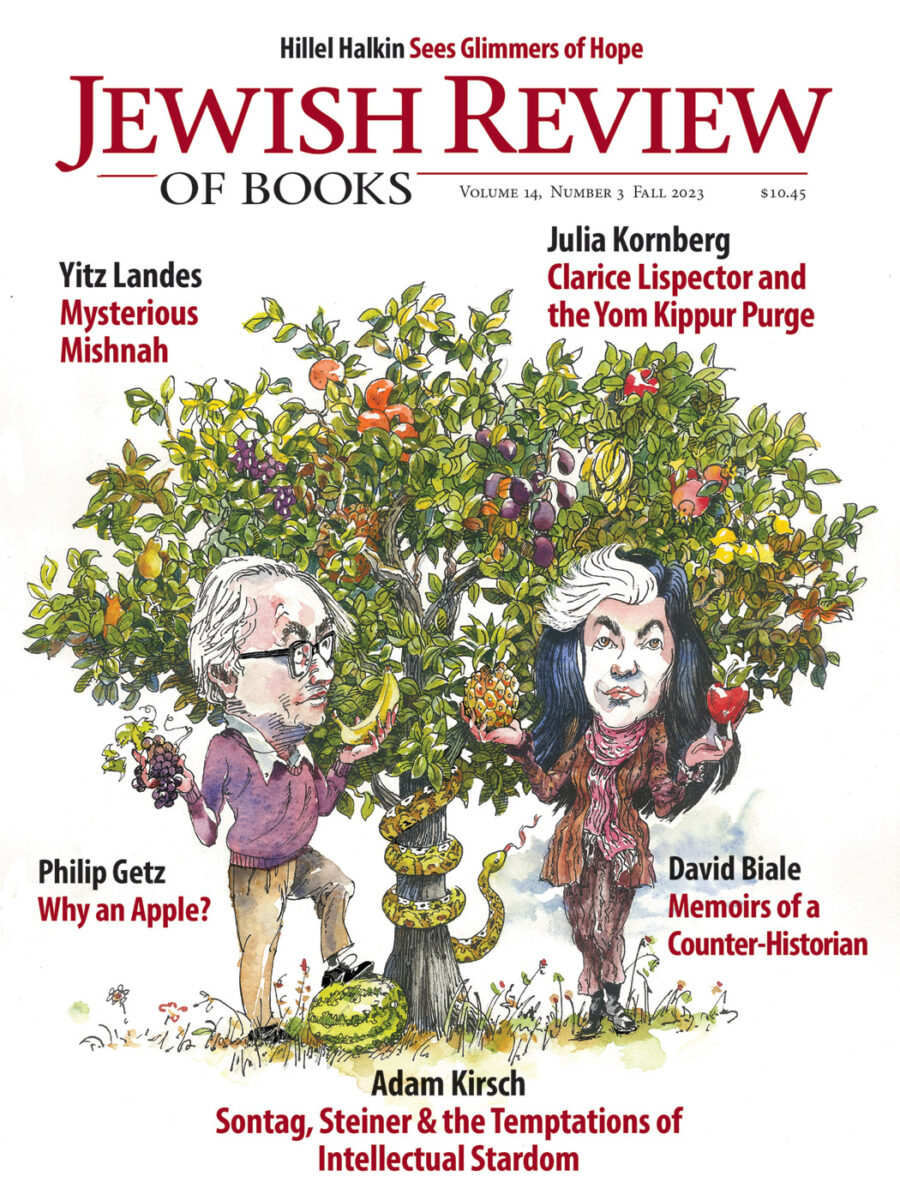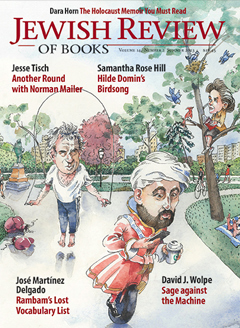Letters
Letters, Spring 2017
Uninspired Cousins and Jewish Excellence, The Menorah and Its Flame, A Joke Retold, Romcom, and Remembering Salonica
Features
The Great Family Circle
Eliezer Ben-Yehuda, “the father of modern Hebrew,” famously raised his own son to be the first child in almost 2,000 years to speak only Hebrew. When Itamar Ben-Avi grew up, he was fascinated by . . . Esperanto. Esther Schor’s new book on L. L. Zamenhof, his would-be universal language, and those who still speak it inspired Stuart Schoffman to revisit the oddly parallel careers of Ben-Yehuda and Zamenhof.
Reviews
Adventure Story
The story of Hebrew is a great story because there is nothing inevitable about it. Whether it was the period of the Bible or the Mishnah or Maimonides, there was always a danger, often the likelihood, that Hebrew would be lost in the break-up of great communities and subsequent migrations.
The Exilarch’s Lost Princess
In real life, or as much of it as historians can reconstruct, Septimania was a name for the region of southern France that included the Jewish populations of such venerable cities as Carcassonne, Narbonne, and Toulouse. Jonathan Levi leans on the most delightfully far-fetched version of these events in his latest novel.
“Repent, Repent”
In his new book, How Repentance Became Biblical: Judaism, Christianity, and the Interpretation of Scripture, David A. Lambert argues that repentance, as we understand it today, is absent from the Hebrew Bible.
The Sephardic Mystique
In the late 18th century, an ardor for ancient Greek art and literature swept through German letters. German Jews were not immune, yet during the same period, they also devoted themselves to recovering the linguistic, artistic, and literary heritage of medieval Sephardic Jewry.
Of Memory, History—and Eggplants
Tension between the quotidian on the one hand and an abiding reserve and unease on the other—is palpable throughout Saul Friedländer’s new memoir.
On the Importance of Booing Mayne Yiddishe Mame
How did Zionist elites create a new national identity for rank and file members whose ideals did not match their own?
A Life with Consequences
Yitzhak Rabin was a realist who saw peacemaking not as the source of security but as a further development that needed to be based upon security.
Of Spies and Centrifuges
Jay Solomon traces decades of spy games between the United States and Iran, a conflict, he writes, “played out covertly, in the shadows, and in ways most Americans never saw or comprehended.”
Big Tent
The American religious landscape that Uzi Rebhun sketches out in his new book, Jews and the American Religious Landscape, is marked by virtually boundless freedom and pluralism, as well as increasing fragmentation, due to the growth of “self-searching and religiosity by choice.”
Is Love Stronger than Death?
Near the outset of his book about mortality, Hillel Halkin has fallen into a grave, gazed at the remnants of a skull, succinctly described ancient Israelite burial practices, and vividly illustrated the ritual and material basis for that resonant biblical phrase in which the dead are “gathered to their ancestors.”
Readings
Funny How a Poem Can Get Under Your Skin
On Celia Dropkin’s avant-garde Yiddish break-up poem and a political insight.
Homer of Lod: The Indispensability of Erez Bitton
The blind writer from Algeria is one of Israel’s most important voices, both in poetry and in policy.
From Hasidism to Marxism
The radical publisher Verso has re-issued Isaac Deutscher’s The Non-Jewish Jew: And Other Essays. But what is a “non-Jewish Jew”? And what was Deutscher?
Lost & Found
Chaim Grade: A Testimony
Toward the end of his life, the talmudist Saul Lieberman published his only Yiddish essay, an appreciation for his friend, the novelist Chaim Grade, the great witness to a lost world. Translated and with an introduction by Allan Nadler.
The Arts
Mystical Teachings Do Not Erase Sorrow
In Yehoshua November’s new collection, however, it turns out that the difficulties of being a Jewish poet do not primarily flow from being either Jewish or a poet but from the underlying difficulties of life itself.
Ready to Wear
Textiles can tell the story of how modernity, for all its many blessings, often erases the practices and values of the collective, celebrating the individual at the expense of community and novelty or fashion at the expense of tradition.
Last Word
A Very Jewish Encounter
The text is full of underlining, circled words or phrases, arrows, careful cross references, and copious comments in Yiddish, English, Spanish, and Hebrew. It’s what my students at Ohio State might call an “extreme reading.”
Past Issues

Issue No. 57
Spring 2024

Issue No. 56
Winter 2024

Issue No. 55
Fall 2023

Issue No. 54